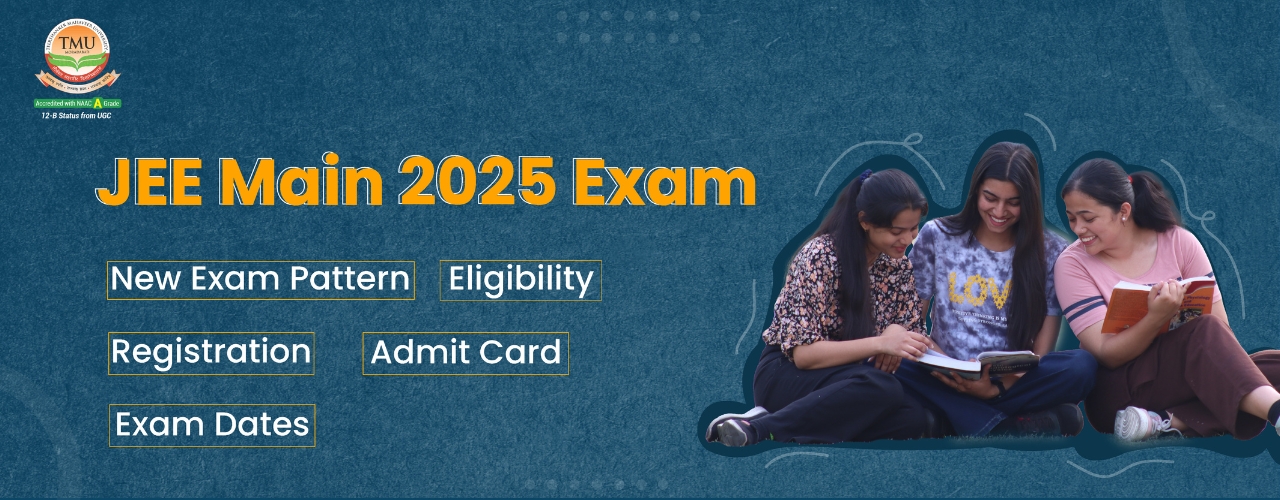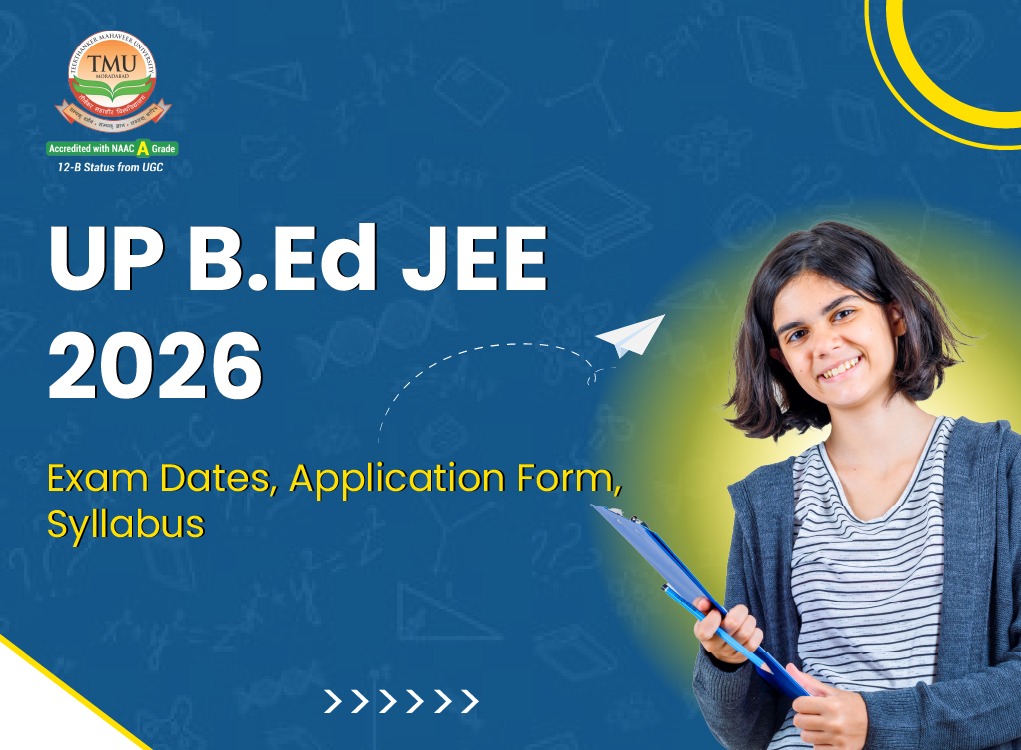JEE Main 2025 Exam, New Exam Pattern, Eligibility, Registration, Admit Card, Exam Dates
Table of Contents
The Joint Entrance Examination (JEE) Main is a national-level entrance examination conducted in India for admission to engineering programs. It is a gateway to prestigious institutions like the Indian Institutes of Technology (IITs).
To be Eligible for JEE Mains, Candidates must have passed Class 12 or equivalent with Physics, Chemistry, and Mathematics are eligible to appear for JEE Main. JEE Main is conducted twice a year, usually in January and April.
The exam pattern consists of two papers: Paper 1 (B.Tech/B.E) and Paper 2 (B.Arch/B.Planning). JEE Main is a CBT (computer-based mode) mode Exam and The syllabus for JEE Main is based on the NCERT textbooks for Class 11 and 12.
JEE Main Full Form
JEE stands for Joint Entrance Examination. It is a standardized CBT (computer-based test) exam for admission to various technical undergraduate programs in engineering, architecture, and planning across colleges in India.
Teerthanker Mahaveer University
Apply for Admission
Click Here To Apply for Admission
What is JEE Main Exam?
The Joint Entrance Examination (JEE) Main is the standard computer-based test for admission to various technical undergraduate programs in engineering, architecture, and planning across colleges in India. It is conducted by the National Testing Agency (NTA) twice a year, in January and April.
JEE Main Exam Overview:
| Feature | Description |
| Purpose | Admission to B. Tech, B. Arch, and B.Planning courses |
| Conducting Body | National Testing Agency (NTA) |
| Frequency | Twice a year (January and April) |
| Exam Mode | Computer-based test (CBT) |
| Subjects | Physics, Chemistry, and Mathematics |
| Question Type | Multiple-choice questions |
| Duration | 3 hours |
| Marking Scheme | 4 marks for correct answers, -1 mark for incorrect answers |
| Importance | The first step towards admission to prestigious institutions like IITs through JEE Advanced |
Note: The exact number of questions and the difficulty level may vary each year.
JEE Mains Exam Pattern
The JEE Main 2025 exam pattern has undergone some changes. Here's a breakdown of the new structure:
| Feature | Paper 1 (B.E./B.Tech) | Paper 2A (B.Arch) | Paper 2B (B.Planning) |
| Subjects | Physics, Chemistry, Mathematics | Mathematics, Aptitude Test, Drawing Test | Mathematics, Aptitude Test, Planning Test |
| Total Questions | 75 | 77 | 100 |
| Section A | 20 MCQs (each subject) | 25 questions (20 MCQs + 5 numerical) | 25 questions (20 MCQs + 5 numerical) |
| Section B | 5 numerical (Each Subject, attempt all) | 50 MCQs (Aptitude), 2 questions (Drawing Test, offline mode) | 50 MCQs (Aptitude), 25 MCQs (Planning Test) |
| Marking Scheme | +4 for correct, -1 for incorrect | +4 for correct, -1 for incorrect | +4 for correct, -1 for incorrect |
| Total Marks | 300 | 400 | 400 |
Key changes:
- Section B for Paper 1 is now clearly defined as requiring all 5 numerical questions to be attempted.
These changes are expected to make the exam more competitive and complex, which experts believe may lead to a lower cut-off compared to previous years.
JEE Main Exam Dates
The official JEE Main 2025 exam dates have not been announced yet. However, based on previous years' patterns, the exam is likely to be conducted in January and April 2025.
Please keep an eye on the official NTA website (https://jeemain.nta.ac.in/ (nofollow)) and other reliable sources for the latest updates on the exam dates.
JEE Mains Eligibility Criteria
The eligibility criteria for JEE Main 2025 are expected to be similar to previous years. Here's a summary of the likely requirements:
Educational Qualification:
- Candidates must have passed Class 12 or equivalent examinations with Physics, Chemistry, and Mathematics as compulsory subjects.
- The minimum aggregate marks required may vary depending on the category (General, OBC, SC, ST, etc.).
Age Limit:
- There is no age limit for JEE Main.
Nationality:
- Indian citizens and international students can appear for JEE Main.
| Criteria | Requirements |
| Educational Qualification | Class 12 or equivalent with Physics, Chemistry, and Mathematics |
| Age Limit | No age limit |
| Nationality | Indian citizens and international students |
Please note that the official eligibility criteria for JEE Main 2025 will be announced by the National Testing Agency (NTA) closer to the exam date. It's advisable to keep an eye on the NTA website ( https://jeemain.nta.ac.in/ ) for the latest updates.
JEE Main Application Form
The JEE Main 2025 application form is expected to be released on the official NTA website (https://jeemain.nta.ac.in/ (no follow)) in the coming months. Once released, you can fill out the application form online.
Here are the general steps involved in filling out the JEE Main application form:
- Online Registration: Create an account on the NTA website and register for JEE Main.
- Fill Application Form: Provide personal, educational, and other relevant details as required.
- Upload Documents: Scan and upload required documents such as passport size photograph, signature, Class 10 and 12 certificates, etc.
- Pay Application Fee: Pay the application fee online using a debit card, credit card, net banking, or UPI.
- Submit Application: Review the application form carefully before submitting it.
Please note that the exact steps and documents required may vary slightly. It's advisable to keep an eye on the NTA website for the latest updates and instructions.
Important points to remember:
- Fill out the application form accurately and carefully.
- Ensure that all required documents are uploaded correctly.
- Pay the application fee on time.
- Submit the application form before the deadline.
JEE Main Registration
The JEE Main 2025 registration process is expected to begin in the coming months. Once the application form is released on the official NTA website (https://jeemain.nta.ac.in/), you can register for the exam.
Here are the general steps involved in registering for JEE Main:
- Visit the NTA Website: Go to the official JEE Main website.
- Create an Account: If you don't have an account already, create a new one.
- Register for JEE Main: Fill out the registration form with your personal and academic details.
- Choose Exam Session: Select the session (January or April) you want to appear for.
- Pay Application Fee: Pay the application fee online using a debit card, credit card, net banking, or UPI.
- Complete Registration: Submit the registration form and note down your application number.
Once you have registered, you will be able to log in to your account to fill out the application form and upload the required documents. Please keep an eye on the NTA website for the latest updates on the JEE Main registration process.
JEE Mains Syllabus 2025
The JEE Main 2025 syllabus is expected to be similar to previous years. However, it's always recommended to check the official NTA website (https://jeemain.nta.ac.in/) for the most accurate and up-to-date syllabus.
Here's a general overview of the JEE Main syllabus (Expected):
| Subject | Topics |
| Physics | Mechanics, Thermodynamics, Waves and Optics, Electromagnetism, Modern Physics |
| Chemistry | Physical Chemistry, Inorganic Chemistry, Organic Chemistry |
| Mathematics | Algebra, Trigonometry, Calculus, Geometry, Vectors and 3D Geometry |
JEE Main 2024 Question Paper PDF
You can find the JEE Main 2024 question papers along with their solutions in PDF format through the official NTA website. The papers for the January 2024 and April 2024 sessions are available for download, covering all subjects and shifts. Here’s a brief overview of what you can expect:
- Availability: The question papers for each shift of the January 2024 exam are accessible, along with detailed solutions.
- Content: Each question paper includes sections for Physics, Chemistry, and Mathematics, structured according to the exam pattern.
For the official download links and further details, you can visit the NTA JEE Main website. This site will provide you with all the necessary materials for preparation and understanding the exam structure.
JEE Main Mock Test
JEE Main Mock Tests are a valuable tool for preparing for the exam. They simulate the actual exam environment, helping you get familiar with the question format, time management, and overall exam experience.
Here are some resources for JEE Main mock tests:
- NTA Website: The official NTA website (https://jeemain.nta.ac.in/) often provides free mock tests closer to the exam date.
- Coaching Institutes: Many coaching institutes offer online and offline mock tests as part of their preparation programs.
- Online Platforms: Several online platforms provide JEE Main mock tests, often with detailed solutions and performance analysis.
Tips for Taking Mock Tests:
- Simulate Exam Conditions: Take mock tests in a quiet environment, timed, and without referring to notes or books.
- Analyze Your Performance: Review your answers and identify areas where you need to improve.
- Time Management: Practice time management during the mock tests to ensure you can complete the exam within the allotted time.
- Learn from Mistakes: Analyze your mistakes and understand the concepts behind them to avoid repeating them in the actual exam.
By practising with mock tests, you can boost your confidence, identify your strengths and weaknesses, and improve your overall performance in the JEE Main exam.
JEE Main Admit Card
The JEE Main Admit Card is an essential document that you need to carry with you on exam day. It contains important information such as your exam centre, reporting time, and other instructions.
To download your JEE Main Admit Card, you will need to visit the official NTA website (jeemain.nta.nic.in) and log in using your application number and password.
Here are the steps on how to download your JEE Main Admit Card:
- Visit the official NTA website: Go to jeemain.nta.nic.in.
- Click on the "JEE Main Admit Card" link: This link will usually be available a few days before the exam.
- Enter your application number and password: Fill in the required details and click on the "Submit" button.
- Download and print your admit card: Once you have successfully logged in, your admit card will be displayed on the screen. Download it and print it out.
Important points to remember:
- Carry your admit card with you on the exam day: You will not be allowed to enter the exam centre without your admit card.
- Check the details on your admit card carefully: Make sure that all the details on your admit card are correct. If you find any errors, contact the NTA immediately.
Follow the instructions on your admit card: The admit card will contain important instructions regarding reporting time, exam rules, and other relevant information. Make sure to read and follow these instructions carefully.
JEE Mains vs JEE Advanced
JEE Main and JEE Advanced are two crucial entrance examinations for engineering programs in India. While both exams evaluate a candidate's aptitude for engineering, they differ in terms of difficulty level, scope, and purpose.
JEE Main
- Purpose: Serves as a screening test for admission to various engineering colleges across India, including the Indian Institutes of Technology (IITs), National Institutes of Technology (NITs), and other prestigious institutions.
- Difficulty Level: Moderate to difficult.
- Syllabus: Covers a wide range of topics from Physics, Chemistry, and Mathematics.
- Marking Scheme: Objective-type questions with negative marking.
- Number of Attempts: Candidates can attempt JEE Main multiple times.
JEE Advanced
- Purpose: Serves as an entrance exam specifically for admission to the Indian Institutes of Technology (IITs).
- Difficulty Level: High.
- Syllabus: Covers the same subjects as JEE Main but in greater depth.
- Marking Scheme: Both objective and subjective questions with negative marking.
- Number of Attempts: Candidates can attempt JEE Advanced a maximum of three times.
Key Differences:
| Feature | JEE Main | JEE Advanced |
| Purpose | Screening tests for various engineering colleges | Entrance exam for IITs |
| Difficulty Level | Moderate to difficult | High |
| Syllabus | Wide range of topics | In-depth coverage of subjects |
| Marking Scheme | Objective-type with negative marking | Objective and subjective with negative marking |
| Number of Attempts | Multiple attempts allowed | Maximum three attempts |
In summary, JEE Main is a gateway to engineering colleges, while JEE Advanced is specifically for IITs. Candidates who qualify for JEE Advanced need to perform well in both exams to secure admission to the prestigious IITs.
Conclusion
In conclusion, the JEE Main exam serves as a critical gateway for aspiring engineering and architecture students in India, with its comprehensive structure and established credibility. As it is conducted by the National Testing Agency (NTA), candidates can expect a well-organised examination process, including clear eligibility criteria, application procedures, and detailed syllabus guidelines.
The 2025 examination pattern introduces notable changes, including the restructured question distribution across papers, which may impact the competitive landscape of the exam. Moreover, the introduction of mock tests and previous year question papers serve as vital resources for effective preparation, enabling candidates to familiarise themselves with the exam format and improve their performance.
Frequently Asked Questions (FAQs)
Q1: Is 120 a bad score in JEE Mains?
Ans: 120 is not necessarily a bad score in JEE Mains. It depends on various factors like the overall difficulty of the exam, the number of candidates appearing, and your targeted college or course. While a higher score is generally preferred, a score of 120 might still be sufficient for admission to certain colleges, especially if you belong to a reserved category or have other factors in your favour.
Q2: What is the rank of 40 in JEE Mains?
Ans: The rank of 40 in JEE Mains cannot be determined without additional information. The rank depends on various factors like the total number of candidates appearing for the exam, the difficulty level of the exam, and the score distribution among all candidates.
Q3: Is 100 a good score in JEE Main?
Ans: 100 might not be considered a very good score in JEE Main, especially if you are aiming for top-tier engineering colleges. However, it's important to note that the overall cutoff varies each year depending on factors like the number of candidates, exam difficulty, and the number of available seats. A score of 100 could still be sufficient for admission to some colleges, especially if you belong to a reserved category or have other factors in your favour.
Q4: What is the rank of 90% in JEE Mains?
Ans: The rank of 90% in JEE Mains cannot be determined directly. The rank is based on the percentile score, which takes into account the relative performance of all candidates. A 90% percentile would indicate that you scored better than 90% of the candidates, but the exact rank would depend on the total number of candidates and the distribution of scores.















